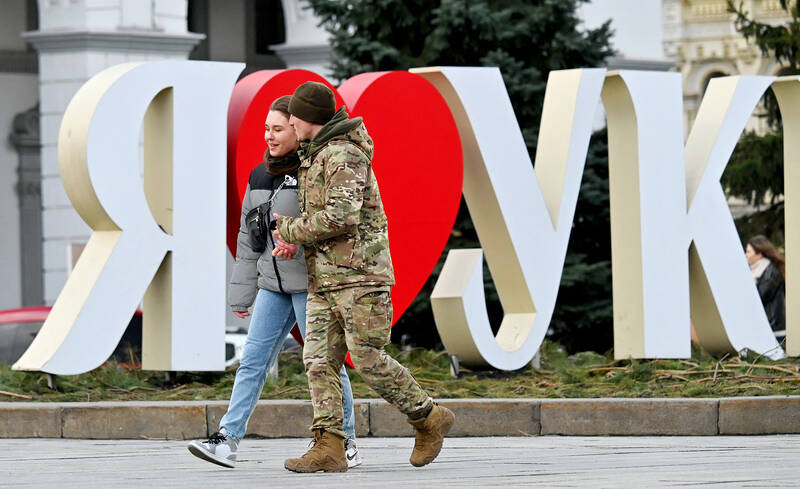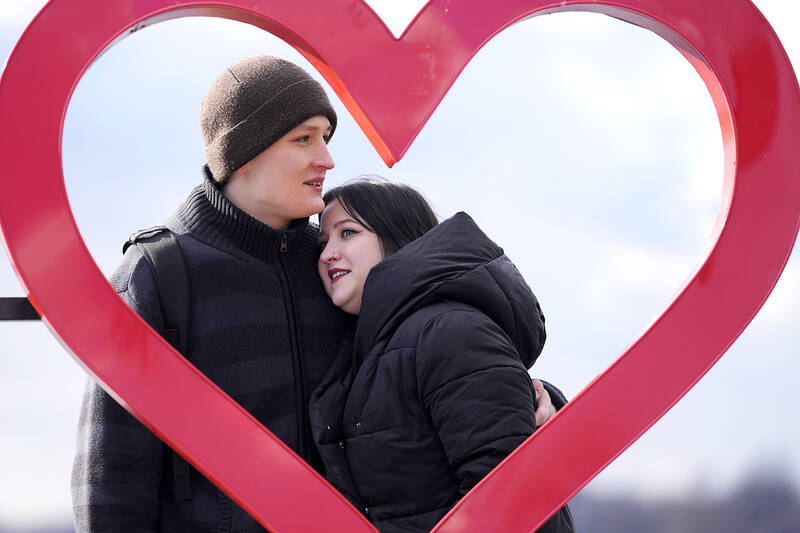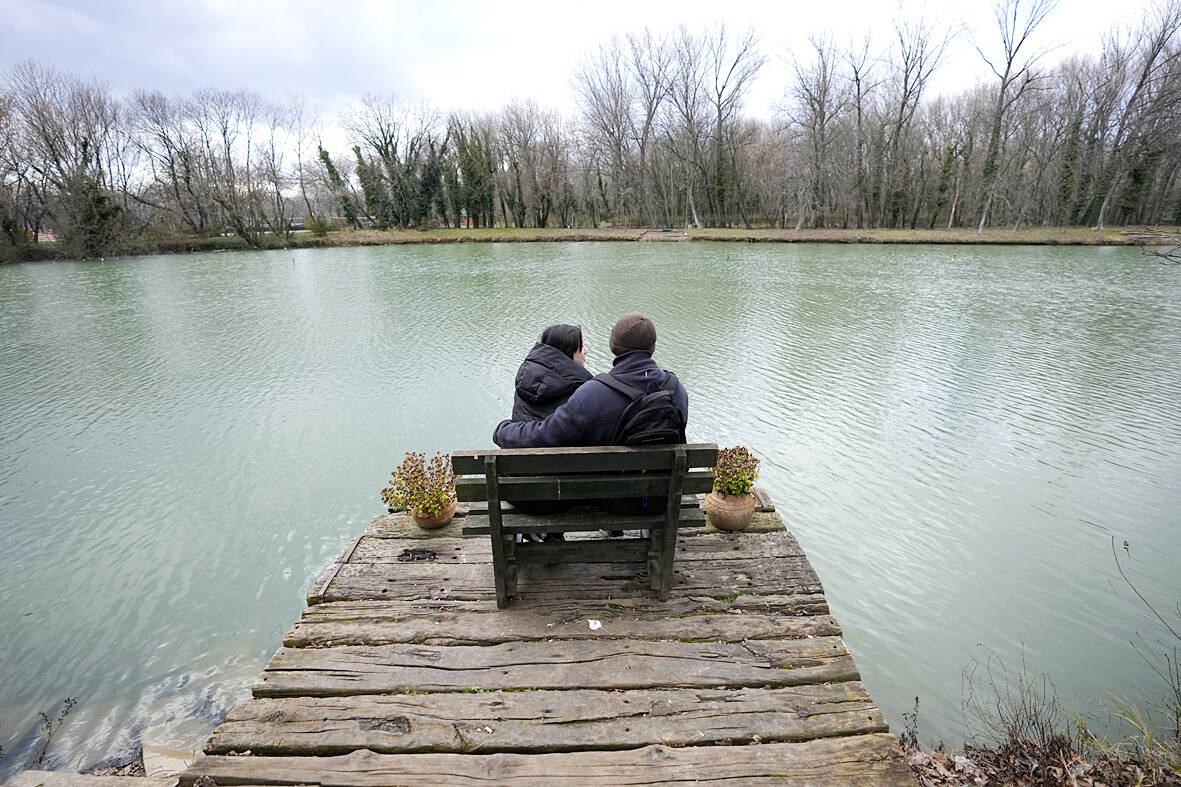For many Ukrainian soldiers, the war with Russia has led to heartbreaking separation from their families, but for others love has blossomed on the frontline.
It was love at first sight when Yulia Nestertsova and soldier Oleg Sytnik met last summer. The young couple tied the knot on Valentine’s Day Tuesday in the northeastern city of Kharkiv.
“The war brought us together,” said 18-year-old Nestertsova of her meeting with Sytnik, 27. “He comes from the Donetsk region, I’m from Kharkiv, we would never have met otherwise.”

Photo: AFP
On Tuesday, they married in an intimate but traditional ceremony in Kharkiv’s town hall witnessed by a small group, including Sytnik’s brothers-in-arms.
After exchanging rings and signing the register, the couple took time to examine the rushnyk — an embroidered fabric with traditional motifs which couples keep for a lifetime.
Their smiles and the kiss they exchanged bore witness to the depth of their feelings, even though they met less than a year ago. Since then, the couple have lived to the rhythm of Oleg’s army leave. Yulia does not hide her “worry,” even if she tries to imagine a happy and peaceful future together.

Photo: AP
“We are stronger together. We care about each other, we look forward to our reunions and every moment is special,” she said.
‘ENTIRELY DIFFERENT STORY’
But further west, in a Kyiv hospital, life is different for Dmytro Lynartovitch, a soldier recovering from his war wounds.

Photo: AP
As the 44-year-old actor-turned-fighter tells his story, he can’t help but strum his guitar to play a few of his own tunes.
Known for several film roles, Lynartovitch took up arms to defend his homeland in the early hours of the Russian invasion. He fought until Jan. 9. That day, in the eastern town of Soledar, besieged by the Russian army, he was hit in the face with shrapnel, losing the use of his left eye and ear.
Now, he has no contact with his wife and two young sons, who left to the US at the start of the war. “My wife and my children, who are over there on the other side of the ocean, will sooner or later take an interest in my health. That is what I hope and what I believe in,” he said.
“The war has separated us, as with many Ukrainians. They will come back when we have peace, but that will be an entirely different story. Because they are going to an English school, they are meeting other people.”
Despite his injury, Lynartovitch does not intend to leave Ukraine before the end of the war, even if he dreams of reuniting with his family one day.
“They will certainly have questions, they will want to ask: ‘Dad, how are you? What are you doing? We are adults now, we want to talk.’”

In the March 9 edition of the Taipei Times a piece by Ninon Godefroy ran with the headine “The quiet, gentle rhythm of Taiwan.” It started with the line “Taiwan is a small, humble place. There is no Eiffel Tower, no pyramids — no singular attraction that draws the world’s attention.” I laughed out loud at that. This was out of no disrespect for the author or the piece, which made some interesting analogies and good points about how both Din Tai Fung’s and Taiwan Semiconductor Manufacturing Co’s (TSMC, 台積電) meticulous attention to detail and quality are not quite up to

April 21 to April 27 Hsieh Er’s (謝娥) political fortunes were rising fast after she got out of jail and joined the Chinese Nationalist Party (KMT) in December 1945. Not only did she hold key positions in various committees, she was elected the only woman on the Taipei City Council and headed to Nanjing in 1946 as the sole Taiwanese female representative to the National Constituent Assembly. With the support of first lady Soong May-ling (宋美齡), she started the Taipei Women’s Association and Taiwan Provincial Women’s Association, where she

It is one of the more remarkable facts of Taiwan history that it was never occupied or claimed by any of the numerous kingdoms of southern China — Han or otherwise — that lay just across the water from it. None of their brilliant ministers ever discovered that Taiwan was a “core interest” of the state whose annexation was “inevitable.” As Paul Kua notes in an excellent monograph laying out how the Portuguese gave Taiwan the name “Formosa,” the first Europeans to express an interest in occupying Taiwan were the Spanish. Tonio Andrade in his seminal work, How Taiwan Became Chinese,

Mongolian influencer Anudari Daarya looks effortlessly glamorous and carefree in her social media posts — but the classically trained pianist’s road to acceptance as a transgender artist has been anything but easy. She is one of a growing number of Mongolian LGBTQ youth challenging stereotypes and fighting for acceptance through media representation in the socially conservative country. LGBTQ Mongolians often hide their identities from their employers and colleagues for fear of discrimination, with a survey by the non-profit LGBT Centre Mongolia showing that only 20 percent of people felt comfortable coming out at work. Daarya, 25, said she has faced discrimination since she